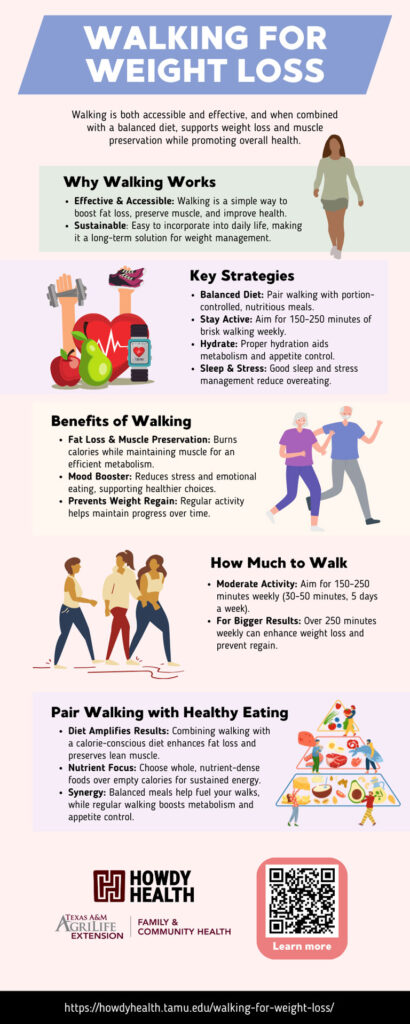Walking is an accessible, effective way to contribute to weight loss goals, especially when combined with a balanced diet. Research shows that walking at a moderate intensity can support weight loss, improve muscle preservation, and offer lasting health benefits. Below, we explore how walking works for weight loss, how to optimize its effects, and the science behind it.
Factors Contributing to Weight Loss
Weight loss is a process influenced by several key elements:
- Caloric Intake: The calories consumed play a major role. A diet focused on balanced portions and nutritious food can support a caloric deficit, essential for weight loss.
- Physical Activity: Regular exercise, like walking, helps create a calorie deficit by increasing daily energy expenditure (calories burned).
- Sleep: Studies show that lack of sleep can disrupt hunger-regulating hormones, which may lead to increased caloric intake.1 Be sure to follow good sleep hygiene habits for your best sleep.
- Stress Management: High stress can elevate cortisol levels, which may lead to overeating or weight gain.2 If you struggle with a lot of stress, consider some of these 11 healthy ways to handle life’s stressors.
- Hydration: Staying adequately hydrated can support weight management by aiding digestion, metabolism, and appetite control. Staying well-hydrated can help prevent mistaking thirst for hunger, which might otherwise lead to unnecessary snacking or eating. Drinking water can curb the sensation of hunger when your body is actually just craving hydration. Good hydration can also make exercise easier and more efficient.3
Why Walking is Beneficial for Weight Loss
Walking offers several specific benefits for weight management:
- Preserves Lean Muscle Mass: Both endurance-type exercise (like walking) and resistance-type exercise (like lifting weights or doing bodyweight exercises) help preserve muscle mass during weight loss.4 This is important because muscles help keep your metabolism running efficiently, meaning you burn more calories even when you’re at rest. Maintaining muscle during weight loss can make it easier to keep the weight off over time.
- Reduces Fat Mass: A 2017 study by Keist et al., published in the Journal of Nutrition, demonstrated that combining moderate walking with a calorie-restricted diet significantly enhanced fat mass loss compared to a calorie-restricted diet alone. Participants who achieved a 500-800 calorie deficit through diet and added moderate physical activity experienced a greater reduction in fat mass and preserved more lean muscle compared to diet-only participants.5
- Mood Enhancement: Regular walking can improve mood and reduce stress, indirectly helping with weight loss by reducing the likelihood of stress-induced eating.6
- Supports Weight Maintenance: Once weight loss is achieved, consistent physical activity like walking helps keep it off.
According to the American College of Sports Medicine (ACSM), for those aiming to lose weight, it is recommended to perform 150-250 minutes per week of moderate physical activity, like brisk walking. This translates to about 30-50 minutes a day, five times a week. For significant weight loss or to prevent weight regain, the ACSM suggests increasing activity to more than 250 minutes per week.7
Why Do Some People Burn More Calories While Walking?
On average, a person weighing 150 pounds, walking a mile in 20 minutes, will burn about 80 calories.8
- Higher Body Weight: A heavier person will naturally burn more calories since their body requires more energy to move.
- Lower Fitness Level: Those who are less fit may burn more calories initially because their bodies are less efficient at performing the activity, resulting in a higher caloric expenditure.
- Increased Metabolic Efficiency Over Time: As you become more fit, your body adapts and becomes more efficient, meaning you may burn fewer calories for the same intensity and duration. However, fitter individuals often continue to burn calories at an elevated rate due to increased lean muscle mass and metabolic rate.
Why Pairing Walking with Healthy Eating is Key
It’s nearly impossible to “out-exercise” a poor diet. According to the Journal of Nutrition study by Kleist et al., participants who combined walking with a calorie deficit experienced the greatest fat loss and health benefits.5 Thus, aligning your walking regimen with nutritious, calorie-conscious eating amplifies results and makes it easier to maintain progress.
Step Your Way into the Habit of Healthy
Walking is a simple, effective way to support weight loss and overall health, especially when paired with a balanced diet and healthy lifestyle habits. Research shows that walking at a moderate intensity can help reduce fat mass, preserve lean muscle, and improve mood, all of which contribute to successful and sustainable weight management. Additionally, walking can play a key role in maintaining weight loss, as regular physical activity helps prevent weight regain over time. For optimal results, align your walking routine with a calorie-conscious eating plan, sufficient sleep, and stress management. Walking not only aids weight loss but also offers numerous long-term health benefits. For more ideas on maximizing your walking workout for added benefits, see our 5 Tips to Boost Your Walking Routine.
Infographic
Download the PDF or share the image below to help others learn more about walking for weight loss.
References
- Broussard JL, Kilkus JM, Delebecque F, Abraham V, Day A, Whitmore HR, Tasali E. Elevated ghrelin predicts food intake during experimental sleep restriction. Obesity (Silver Spring). 2016 Jan;24(1):132-8. doi: 10.1002/oby.21321.
- Geiker NRW, Astrup A, Hjorth MF, et al. Does stress influence sleep patterns, food intake, weight gain, abdominal obesity and weight loss interventions and vice versa? Obesity Reviews: An Official Journal of the International Association for the Study of Obesity. 2018 Jan;19(1):81-97. DOI: 10.1111/obr.12603.
- Johns Hopkins University. Yes, drinking more water may help you lose weight. Newswire The Hub, January 15, 2020, https://hub.jhu.edu/at-work/2020/01/15/focus-on-wellness-drinking-more-water/.
- Cava E, Yeat NC, Mittendorfer B. Preserving Healthy Muscle during Weight Loss. Adv Nutr. 2017 May 15;8(3):511-519. doi: 10.3945/an.116.014506. PMID: 28507015.
- Kleist B, Wahrburg U, Stehle P, Schomaker R, Greiwing A, Stoffel-Wagner B, Egert S. Moderate Walking Enhances the Effects of an Energy-Restricted Diet on Fat Mass Loss and Serum Insulin in Overweight and Obese Adults in a 12-Week Randomized Controlled Trial. J Nutr. 2017 Oct 1;147(10):1875-1884. doi: 10.3945/jn.117.251744.
- American Psychological Association. Working out boosts brain health. American Psychological Association, March 4, 2020, www.apa.org/topics/exercise-fitness/stress.
- Donnelly JE, Blair SN, Jakicic JM, Manore MM, Rankin JW, Smith BK; American College of Sports Medicine. American College of Sports Medicine Position Stand. Appropriate physical activity intervention strategies for weight loss and prevention of weight regain for adults. Med Sci Sports Exerc. 2009 Feb;41(2):459-71. doi: 10.1249/MSS.0b013e3181949333.
- Cleveland Clinic. Walking: Can it help you lose weight? November 19, 2021, https://health.clevelandclinic.org/can-you-lose-weight-by-walking.



